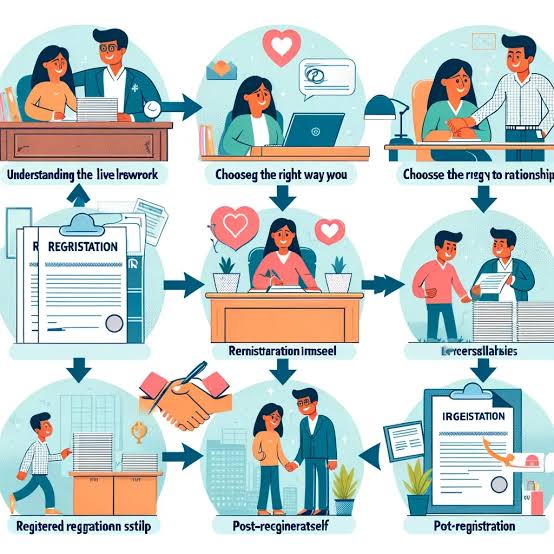LEGISLATURE DRAFTING The Live-in-Relationship (Regulation and Protection) Act, 2023
An Act to make provisions for live-in relationships for the citizens of India; in interest of both Parties, and for connected purposes.
BE it enacted by Parliament in the Seventy Sixth Year of Republic of India as follows :–
Statement of Objectives and Reasoning.– Given the prevalence of live-in-relationships in India,
It is imperative to establish a legal framework that addresses the rights, responsibilities, and Protections of individuals in live-in-relationships. There is, at present, considerable uncertainty as To law on the subject of live-in-relationships, as disputes arising under the same are subject to Precedents and guidelines established by courts of law which are not uniformly applicable.
2. This Act seeks to fill in the legislative void with respect to the regulation and protection of rights
And responsibilities of individuals in live-in-relationships. It provides legal recognition, Mechanisms for dispute resolution, and safeguarding their interests by comparing and applying the Proposed framework with existing laws, the Act ensures that live-in-relationships are recognized
And governed differently, reflecting their unique nature. The Act places paramount importance on
The welfare and security of individuals, particularly children, within live-in-relationships, aiming To provide them with adequate legal safeguards.
CHAPTER I
PRELIMINARY
(REGULATION AND PROTECTION) ACT, 2023.
(2) It extends to the whole of India including the Territories of States; Union Territories; and other Territories as may be acquired. All live-in-relationships arising outside said territories are subject To the law of the land they are residing in outside India.
(3) It shall come into force on such date as the Central Government may, by notification in the Official Gazette.
2. Definitions.– In this Act, unless the context otherwise requires,–
(a) Live-in-Relationship: Refers to a domestic arrangement where two individuals cohabit Without formal marriage, sharing their lives, responsibilities, resources, and performing voluntary Sexual intercourse akin to a marital relationship.
(b) Partners: Denotes individuals involved in a live-in-relationship.
© Children of the Relationship: Encompasses biological, or children born through reproductive Methods during the existence of the live-in-relationship.
(d) Child: biological children conceived by partners.
(€ )Cohabitation Agreement: Signifies a written contract between partners delineating their rights And responsibilities.
(f) Domestic Violence: Holds the same meaning as defined in the Protection of Women from Domestic Violence Act, 2005.
(g) Mediation: Signifies a voluntary dispute resolution process facilitated by a neutral third party.
(h) Arbitration: Denotes a dispute resolution method outside the court system, overseen by an Arbitrator.
(j) Spousal Support: Entails financial support provided to a partner as per this Act’s provisions.
(k) Annulment: Refers to the legal declaration of the nullity of a live-in-relationship.
(l) Asset Protection: Signifies measures taken to safeguard individual assets within the Relationship.
(m) Cohabitation: Denotes the act of two individuals living together in a romantic or domestic
Relationship, either prior to or instead of marriage, inclusive of same-sex relationships.
(n) Property: Encompasses both movable and immovable assets.
(o) Maintenance: Includes financial support for both partners and their children.
(p) Minor: Refers to individuals under the age of 18, with specific reference to the Protection of Children from Sexual Offences (POCSO) Act, 2012, where applicable.
(q) Designated Authority: Means an authority appointed under the provisions of the Live-in Relationship (Regulation and Protection) Act, 2023, for the registration of live-in relationships.
ELIGIBLITY AND REGISTRATION LIVE-IN RELATIONSHIP
(define with respect to what is explained in HMA) , as per this Act, are eligible to enter into a Live-in relationship.
(2) Subsection (1) applies regardless of whether subsections (3) and (4) are complied with.
(3) After the live-in relationship document has been signed under subsection (1), it must also be Signed, in the presence of the individuals in the live-in relationship and each other, by:
(a) each of the two witnesses,
(b) the designated authority.
(4) After the witnesses and the designated authority have signed the live-in relationship document, The designated authority must ensure that:
(a) the fact that the two individuals have registered as partners in a live-in relationship,
(b) any other information prescribed by regulations, is recorded in the register as soon as is Practicable.
(5) No religious service is to be used while the designated authority is officiating at the signing of A live-in relationship document.
(6) Section 4(1) of the Live-in Relationship (Regulation and Protection) Act, 2023. Has given Meaning to this section.
(7) For the registration of live-in relationships, In this Act, “designated authority” means an Authority appointed under the provisions of the Live-in Relationship (Regulation and Protection) Act, 2023.
CHAPTER III
RIGHTS AND OBLIGATIONS OF COHABITING COUPLES
5.Recognition of Live-in-Relationships.– (1) Live-in-relationships shall be officially recognized As valid domestic relationships under the provisions of this Act.
(2) Partners engaged in a live-in-relationship shall be entitled to the rights and responsibilities set Forth herein.
6. Rights and Obligations of Partners .– The partners in a live-in-relationship must perform their Duties and obligations, unless same is excused under provisions of this Act, or of any other law.
1) Partners within a live-in-relationship shall enjoy equal rights and responsibilities, particularly In matters concerning financial support, property, and child custody.
2) Partners have the right to co-own property, establish joint bank accounts, and collaboratively Decide on financial and household matters.
3) In the event of separation, partners retain the right to seek financial support from one another As determined by the court.
4) The Act ensures the protection of the rights of Children of the Relationship, encompassing Financial support, inheritance, and custody rights.
CHAPTER IV
DISSOLUTION AND NULLITY OF LIVE-IN RELATIONSHIPS
7. Dissolution of Live-in Relationships.– A live-in relationship may be dissolved based on the Grounds of irretrievable breakdown, provided that both individuals involved consent to the Dissolution.
8. Nullity of Live-in Relationships.– The criteria for nullity of live-in relationships and the Process for declaring a live-in relationship as void or voidable shall align with the provisions Outlined in the Special Marriage Act, 1954, with appropriate adjustments, grounds for Nullity of Live-in Relationships–
1) A live-in relationship may be declared null and void when there is an irretrievable breakdown In the relationship, making it impossible for the partners to continue living together as a Couple. This could result from significant differences, conflicts, or circumstances that make Cohabitation untenable.
2) If one of the individuals involved in the live-in relationship is below the age of consent (18 Years), the relationship may be declared null and void. This adjustment aligns with the age Requirement stipulated in the SMA for marriage.
3) If the live-in relationship was entered into under fraudulent circumstances, where one partner Misled the other or misrepresented facts significantly, it may be declared void. For example, If one partner falsely claimed to be unmarried or concealed a prior marriage.
4) If one of the individuals was coerced or forced into the live-in relationship against their will, It may be declared void. This aligns with the provision in the SMA that considers marriages Void if one party was coerced into the marriage.
5) Just as in the SMA, live-in relationships between individuals closely related within the Prohibited degrees of consanguinity or affinity may be declared null and void. These Prohibited degrees are defined in the Act, and relationships within these degrees are Considered socially or legally unacceptable due to their close kinship.
6) If one of the partners is incapable of engaging in a sexual relationship due to impotence or a Physical condition, and this condition was not disclosed before the live-in relationship began, The relationship may be declared void.
9. Termination of Agreement.– The cohabitation agreement, a cornerstone of the Cohabitation Relationship, shall cease to be in effect automatically upon the lawful marriage of the partners.
PROTECTION OF VULNERABLE PARTIES
10. Protection of Children.– The paramount importance shall be accorded to the welfare of Children of the Relationship. In cases where it is deemed necessary for the well-being of the Children, the court may appoint a guardian to ensure their physical and emotional well-being.
Partners shall share the responsibility of contributing jointly to the upbringing and education of
Their children, fostering an environment conducive to their growth and development.
11. Child Custody and Support.– Elaborate procedures for determining child custody in Cohabitation relationships shall be meticulously outlined, giving paramount consideration to the Best interests of the child.
Such procedures shall be subject to the jurisdiction of family courts, which are specialized in Handling matters related to child custody and support.
12. Domestic Violence.– In cases where domestic violence casts a dark shadow over the Relationship, the partner who has suffered such violence shall have the right to seek protection Orders under the Protection of Women from Domestic Violence Act, 2005.
Perpetrators of domestic violence shall be held accountable for their actions and may face Appropriate penalties under this Act, ensuring the safety and well-being of individuals in live-in Relationships.
13. Spousal Support (Maintenance) in Cohabitation Relationships.– Spousal support, also Referred to as maintenance, may be applicable in Cohabitation relationships when one partner is Financially dependent on the other or has made significant sacrifices, such as career or economic Opportunities, for the benefit of the relationship.
1) The determination of spousal support shall consider various factors, including but not limited To:
a) Duration of the Cohabitation relationship.
b) Financial needs and resources of each partner
c) Standard of living established during the relationship.
d) Contributions made by each partner to the relationship, both financial and non-financial.
e) Age, health, and employability of each partner.
f) Any agreements or understandings between the partners regarding support.
2) Spousal support may take various forms, such as periodic payments, lump-sum settlements, Or the allocation of specific assets. The type and duration of support shall be determined based On the specific circumstances of the relationship and the partners involved.
3) The duration of spousal support shall be determined with careful consideration of factors like The length of the Cohabitation relationship, the recipient partner’s ability to become Financially independent, and the overall goal of ensuring fairness and equity, which is under The jurisdiction of family courts.
4) Spousal support arrangements may be subject to modification if there are significant changes In circumstances, such as changes in income, employment status, or health. Such Modifications shall be made in a manner that continues to prioritize fairness and equity.
14. Savings Clause.– To uphold the principles of fairness and continuity, any rights, obligations, Or agreements entered into before the enactment of this Act shall remain unaffected by its Provisions, preserving the sanctity of prior commitments and arrangements. This provision ensures The preservation of established rights and legal arrangements.
15. Cohabitation Agreement.– Partners in a Cohabitation relationship shall enjoy the liberty to Enter into agreements meticulously designed to safeguard their individual assets, thereby fostering Financial security and peace of mind.
Partners shall retain the prerogative to amend their cohabitation agreement to reflect evolving Circumstances and changing needs.Such agreements shall be governed by the procedures and principles outlined in the Indian Contract Act, 1872, ensuring legal clarity and enforceability.
16. Determination of Paternity.– 1) Determining paternity in Cohabitation relationships shall be Approached with utmost care and consideration, acknowledging the rights and responsibilities of All parties involved.
2) The process of paternity determination shall follow these thoughtful procedures–
The court’s decision shall be based on the best interests of the child and the principles of fairness And equity.
17. Desertion.– Desertion, defined as one partner’s deliberate and unjustified abandonment of the Cohabitation relationship, shall be acknowledged as a severe breach of the partnership’s Obligations and shall serve as substantial grounds for legal action
In cases of desertion of the live-in-relationship, every reasonable effort shall be exerted to locate The absent partner. If, after exhaustive attempts, the deserting partner remains untraceable, such Circumstances shall constitute legal grounds for initiating appropriate legal action.
18. Abortion Rights.– Partners in a Cohabitation relationship, whether involving biological, Children conceived through assisted reproductive methods (such as IVF) by both the parties in the Live in relationship shall jointly exercise equal and unwavering decision-making authority when Addressing matters related to abortion rights.
CHAPTER VI
DISPUTE RESOLUTION IN LIVE-IN-RELATIONSHIPS
19. Mechanisms for Dispute Resolution.– Dispute resolution mechanisms in Cohabitation Relationships shall be governed by the provisions of the Arbitration and Conciliation Act, 1996,Unless otherwise agreed upon by the parties or as prescribed by this Act.
20. Cost Allocation.– The allocation of costs related to dispute resolution mechanisms shall be Determined based on the outcome of the resolution process and in accordance with the Arbitration And Conciliation Act, 1996.
21. Mediation.– Mediation, as a primary method for resolving disputes within Cohabitation Relationships, shall be encouraged and prioritized.
Mediation shall involve a neutral third party, either mutually agreed upon by the partners or Appointed by the court, whose role shall be to facilitate communication and negotiation between The parties with the aim of reaching a mutually acceptable resolution.
Mediation shall prioritize preserving the relationship, safeguarding the best interests of any Children involved, and ensuring the fair distribution of assets and responsibilities.
22. Arbitration.– In the event that mediation fails to yield a resolution, partners may opt for Arbitration as an alternative dispute resolution method.
Arbitration shall involve the appointment of an impartial arbitrator, agreed upon by the parties, Who shall render a binding decision after considering the merits of the dispute.
The arbitration process shall aim to provide a fair and just resolution while maintaining the privacy And efficiency of the Cohabitation relationship.
23. Legal Proceedings if Alternative Dispute Resolution fails.– In cases where mediation and Arbitration fail to yield a resolution, partners may resort to legal proceedings under the jurisdiction Of family courts.
Legal proceedings shall be guided by the relevant provisions of this Act, ensuring fairness, equity, And the protection of the rights and responsibilities of all parties involved.

CHAPTER VII MISCELLANEOUS
24. Enforcement and Penalties.– Any person found in violation of this Act shall be subject to Penalties as determined by law, with due consideration for the nature and severity of the violation.
25. Amendment and Repeal.– This Act may be amended or repealed by subsequent legislation As deemed necessary by the competent legislative authority.
26. Power to Remove Difficulties.– In the event that any difficulty arises in giving effect to the Provisions of this Act, the Central Government may, by order published in the Official Gazette, Make such provisions not inconsistent with the provisions of this Act as may appear to be necessary For removing the difficulty, ensuring the smooth implementation of the Act.
27. Act to Have Overriding Effect.– The provisions of this Act shall have an overriding effect On any other law in force, ensuring that the rights and responsibilities outlined herein take Precedence
28. Act to be Gender-Neutral.– This Act shall be construed as gender-neutral and shall apply Equally to all individuals, irrespective of gender, promoting equality and fairness in Cohabitation Relationships.
29. Act Not to Prejudice Customary Laws. – Nothing in this Act shall prejudice the provisions Of any customary law or any other law for the time being in force, respecting the diversity of legal Traditions within the country.
30. Jurisdiction.– Courts with jurisdiction over family matters, as prescribed by law, shall have The authority to adjudicate cases under this Act, ensuring specialized and informed decisions in Matters pertaining to Cohabitation relationships.
31. Marriage and live in relationship- Since the Vedic culture, marriage has been revered as a Sacred union in India. In India, marriages are solemnized according to the requirements of the Special Marriage Act or the personal laws of the religions of the parties. According to the law,
Marriage is a contract between a man and a woman in which they agree to support and live Together. Marriage as a concept has evolved over time. After a formal ceremony, marriage is Usually considered one of the basic rights of citizens. It has a legal meaning and includes a Number of duties and responsibilities related to property inheritance, inheritance and other Matters. As a result, marriage includes all the legal requirements of tradition, revelation, and Election, as well as the legal consequences of that relationship.
In many western countries, people live a lot in relationships. The definition of cohabitation is a Living arrangement in which non-marital partners live together to maintain a long-term Relationship comparable to marriage. The basic principle of cohabitation is that potential Partners want to assess their compatibility before committing. Without marriage, a live-in A relationship is a de facto union where the couple sleeps in the same room. In the West, commonmarriages, informal marriages, fictitious marriages, arranged marriages and other names for this Non-marriage is used. Although there is no legally recognized marriage ceremony, civil Marriage contract or civil registration, it is a type of human relationship that is legally recognized As marriage in some jurisdictions. Most residential partnerships take place in large cities. In a A large part of India, which consists of cities and villages, such a practice is still considered taboo.
Due to a number of factors, including tolerance and lack of commitment, there is a gradual shift From the sacrament of arranged marriage to love marriages and eventually to live-in Relationships.
The Live-in-Relationship (Regulation and Protection) Act, 2023, seeks to provide a comprehensive Legal framework for recognizing, regulating, and protecting the rights and responsibilities of Individuals in live-in relationships in India. It addresses a pressing need, given the prevalence of Such relationships in the country and the absence of clear legislation governing them. This Act Begins by defining critical terms such as “live-in-relationship,” “partners,” “children of the Relationship,” and other related concepts. It lays the foundation by establishing eligibility criteria For individuals entering live-in relationships and the process for their registration. This ensures that The law is applicable across India and clarifies the legal status of such relationships. The Act Recognizes the unique nature of live-in relationships and provides partners with equal rights and Obligations. It emphasizes financial security, property rights, and child custody. In cases of Dissolution, it allows for separation based on mutual consent and addresses the nullity of Relationships under specified circumstances. The Act prioritizes the welfare and protection of Vulnerable parties, particularly children. It outlines procedures for determining child custody and Support while addressing issues related to domestic violence. Spousal support or maintenance is Addressed comprehensively, ensuring fairness and equity. The legislation also offers mechanisms For dispute resolution, with mediation and arbitration as preferred methods before resorting to legalProceedings. It maintains a gender-neutral approach, ensuring equal protection to all individuals, Regardless of gender, and respects customary laws where applicable. In conclusion, The Live-in-Relationship (Regulation and Protection) Act, 2023, endeavors to bring clarity and fairness to the Lives of individuals in live-in relationships. It balances the rights and responsibilities of partners, prioritizes the welfare of children, and provides a legal framework for dispute resolution. This Act Marks a significant step towards recognizing and regulating live-in relationships, fostering an Environment of security and stability for those choosing this domestic arrangement.
Submitted by
Urvashi Manwani (BA LLB. DIVISION – B)
(Top 25 Blogs) SYMBIOSIS LAW SCHOOL NAGPUR, BlogCompetition In India 2024 by The Law Literates





